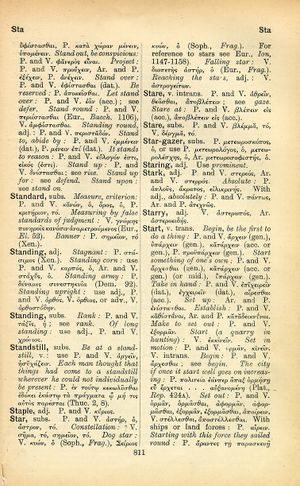start: Difference between revisions
στάζει γὰρ αὖ μοι φοίνιον τόδ᾽ἐκ βυθοῦ κηκῖον αἷμα → blood oozing from the deep wound, bloody gore drops oozing from the depths of my wound
(Woodhouse 4) |
(CSV5) |
||
| Line 1: | Line 1: | ||
{{ | {{Woodhouse1 | ||
| | |Text=[[File:woodhouse_811.jpg|thumb|link={{filepath:woodhouse_811.jpg}}]]'''v. trans.''' | ||
<b class="b2">Begin, be the first to do a thing</b>: P. and V. ἄρχειν (gen.), ὑπάρχειν (gen.) <b class="b2"></b>, κατάρχειν (acc. or gen.), P. προϋπάρχειν (gen.). | |||
<b class="b2">Start something of one's own</b>: P. and V. ἄρχεσθαι (gen.), κατάρχειν (acc. or gen.) (or mid.), ὑπάρχειν (gen.). | |||
<b class="b2">Take in hand</b>: P. and V. ἐπιχειρεῖν (dat.), ἐγχειρεῖν (dat.), αἴρεσθαι (acc.). | |||
<b class="b2">Set up</b>: Ar. and P. ἐνίστασθαι. | |||
<b class="b2">Establish</b>: P. and V. καθιστάναι, Ar. and P. καταδεικνύναι. | |||
<b class="b2">Make to set out</b>: P. and V. ἐξορμᾶν. | |||
<b class="b2">Start</b> (<b class="b2">a quarry in hunting</b>): V. ἐκκινεῖν. | |||
<b class="b2">Set in motion</b>: P. and V. ὁρμᾶν, κινεῖν. | |||
V. intrans. [[begin]]: P. and V. ἄρχεσθαι; see [[begin]]. | |||
<b class="b2">The city if once it start well goes on increasing</b>: P. [[πολιτεία]] [[ἐάνπερ]] [[ἅπαξ]] ὁρμήσῃ [[εὖ]] ἔρχεται... αὐξανομένη (Plat., ''Rep.'' 424A). | |||
<b class="b2">Set out</b>: P. and V. ὁρμᾶν, ὁρμᾶσθαι, ἀφορμᾶν, ἀφορμᾶσθαι, ἐξορμᾶν, ἐξορμᾶσθαι, ἀπαίρειν, V. στέλλεσθαι, ἀποστέλλεσθαι. | |||
<b class="b2">With ships</b> or <b class="b2">land forces</b>: P. αἴρειν. | |||
<b class="b2">Starting with this force they sailed round</b>: P. ἄραντες τῇ παρασκευῇ ταύτῃ περιέπλεον. (Thuc. 2, 23). | |||
<b class="b2">I would have you save the money with which I started</b>: V. σῶσαί σε χρήμαθʼ οἷς συνεξῆλθον [[θέλω]] (Eur., <b class="b2">Hec.</b> 1012). | |||
<b class="b2">Be startled</b>: P. and V. φρίσσειν, τρέμειν, ἐκπλήσσεσθαι. | |||
<b class="b2">Start up</b>: P. and V. ἀνίστασθαι, ἐξανίστασθαι, P. ἀνατρέχειν, Ar. and V. ἀνᾴσσειν (also Xen. but rare P.). | |||
<b class="b2">To start with, at first</b>: P. and V. τὸ πρῶτον; see under [[first]]. | |||
'''subs.''' | |||
<b class="b2">Beginning</b>: P. and V. [[ἀρχή]], ἡ. | |||
<b class="b2">Journey</b>: P. and V. [[ὁδός]], ἡ. | |||
<b class="b2">Putting out to sea</b>: P. [[ἀναγωγή]], ἡ. | |||
<b class="b2">Get a start</b>, v.: P. and V. [[φθάνω|φθάνειν]], προφθάνειν. | |||
<b class="b2">Get the start of</b>: P. and V. [[φθάνω|φθάνειν]] (acc.), προφθάνειν (acc.), [[προλαμβάνω|προλαμβάνειν]] (acc.), P. προκαταλαμβάνειν (acc.). | |||
<b class="b2">The trireme had a start of about a day and a night</b>: P. (ἡ [[τριήρης]]) προεῖχε ἡμέρᾳ καὶ νυκτὶ μάλιστα (Thuc. 3, 49). | |||
<b class="b2">Let me and him have a fair start that we may benefit you on equal terms</b>: Ar. ἄφες ἀπὸ βαλβίδων ἐμὲ καὶ τουτονὶ ἵνα σʼ [[εὖ]] ποιῶμεν ἐξ ἴσου (<b class="b2">Eq.</b> 1159). | |||
<b class="b2">Shudder</b>: P. and V. [[τρόμος]], ὁ. | |||
<b class="b2">Give one a start</b>: use P. and V. ἔκπληξιν [[παρέχω|παρέχειν]] (dat.). | |||
}} | }} | ||
Revision as of 10:04, 21 July 2017
English > Greek (Woodhouse)
v. trans.
Begin, be the first to do a thing: P. and V. ἄρχειν (gen.), ὑπάρχειν (gen.) , κατάρχειν (acc. or gen.), P. προϋπάρχειν (gen.).
Start something of one's own: P. and V. ἄρχεσθαι (gen.), κατάρχειν (acc. or gen.) (or mid.), ὑπάρχειν (gen.).
Take in hand: P. and V. ἐπιχειρεῖν (dat.), ἐγχειρεῖν (dat.), αἴρεσθαι (acc.).
Set up: Ar. and P. ἐνίστασθαι.
Establish: P. and V. καθιστάναι, Ar. and P. καταδεικνύναι.
Make to set out: P. and V. ἐξορμᾶν.
Start (a quarry in hunting): V. ἐκκινεῖν.
Set in motion: P. and V. ὁρμᾶν, κινεῖν.
V. intrans. begin: P. and V. ἄρχεσθαι; see begin.
The city if once it start well goes on increasing: P. πολιτεία ἐάνπερ ἅπαξ ὁρμήσῃ εὖ ἔρχεται... αὐξανομένη (Plat., Rep. 424A).
Set out: P. and V. ὁρμᾶν, ὁρμᾶσθαι, ἀφορμᾶν, ἀφορμᾶσθαι, ἐξορμᾶν, ἐξορμᾶσθαι, ἀπαίρειν, V. στέλλεσθαι, ἀποστέλλεσθαι.
With ships or land forces: P. αἴρειν.
Starting with this force they sailed round: P. ἄραντες τῇ παρασκευῇ ταύτῃ περιέπλεον. (Thuc. 2, 23).
I would have you save the money with which I started: V. σῶσαί σε χρήμαθʼ οἷς συνεξῆλθον θέλω (Eur., Hec. 1012).
Be startled: P. and V. φρίσσειν, τρέμειν, ἐκπλήσσεσθαι.
Start up: P. and V. ἀνίστασθαι, ἐξανίστασθαι, P. ἀνατρέχειν, Ar. and V. ἀνᾴσσειν (also Xen. but rare P.).
To start with, at first: P. and V. τὸ πρῶτον; see under first.
subs.
Beginning: P. and V. ἀρχή, ἡ.
Journey: P. and V. ὁδός, ἡ.
Putting out to sea: P. ἀναγωγή, ἡ.
Get a start, v.: P. and V. φθάνειν, προφθάνειν.
Get the start of: P. and V. φθάνειν (acc.), προφθάνειν (acc.), προλαμβάνειν (acc.), P. προκαταλαμβάνειν (acc.).
The trireme had a start of about a day and a night: P. (ἡ τριήρης) προεῖχε ἡμέρᾳ καὶ νυκτὶ μάλιστα (Thuc. 3, 49).
Let me and him have a fair start that we may benefit you on equal terms: Ar. ἄφες ἀπὸ βαλβίδων ἐμὲ καὶ τουτονὶ ἵνα σʼ εὖ ποιῶμεν ἐξ ἴσου (Eq. 1159).
Shudder: P. and V. τρόμος, ὁ.
Give one a start: use P. and V. ἔκπληξιν παρέχειν (dat.).

